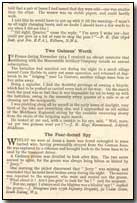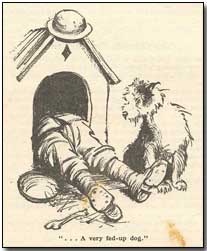Memoirs & Diaries - The Best 500 Cockney War Stories - Two Guineas' Worth and Other Stories
 Published in London
in 1921, The Best 500 Cockney War Stories
comprised, in the words of its newspaper publisher (The London Evening
News) "a remembering and retelling of those war days when laughter
sometimes saved men's reason".
Published in London
in 1921, The Best 500 Cockney War Stories
comprised, in the words of its newspaper publisher (The London Evening
News) "a remembering and retelling of those war days when laughter
sometimes saved men's reason".
The collection of short memoirs, some 500 in total, is divided into five categories - Action, Lull, Hospital, High Seas and Here and There. This page contains five stories from Lull, led by Two Guineas' Worth.
Other sections within the collection can be accessed using the sidebar to the right.
Two Guineas' Worth
In France during November 1914 I received an abrupt reminder that soldiering with the Honourable Artillery Company entails an annual subscription.
The battalion had marched out during the night to a small village named Croix Barbee to carry out some operation, and returned at day-break to its "lodging" near La Couture, another village some four or five miles away.
Being a signaller, I had the doubtful privilege of owning a bicycle, which had to be pushed or carried every inch of the way. On the march back the mud was so bad that it was impossible for me to keep up with the battalion, owing to the necessity every quarter of a mile or so of cleaning out the mudguards.
I was plodding along all by myself in the early hours of daylight, very tired of the bike and everything else, and I approached an old soldier of the Middlesex Regiment sitting by the roadside recovering slowly from the strain of the fatiguing night march.
He looked at me and, with a twinkle in his eye, said, "Well, mate, 'ad yer two guineas wurf yet?"
J. H. May, Ravenswood, Ashford, Middlesex
The Four-footed Spy
Whilst we were at Arras a horse was found entangled in some barbed wire, having presumably strayed from the German lines. He was captured by a rifleman and brought back to the horse lines to be used by the transport driver.
A Cockney groom was detailed to look after him. The two never seemed to agree, for the groom was always being bitten or kicked by "Jerry."
One morning the picket discovered that "Jerry" was missing, and concluded that he must have broken away during the night. The matter was reported to the sergeant, who went and routed out the groom.
"What about it? Ain't you goin' to look for 'im?" said the sergeant.
"Not me, sarge! I always said the blighter was a blinkin' spy!" replied the groom.
J. Musgrave (late 175th Infantry Brigade), 52 Cedar Grove, South Ealing, W.5
Not Every Dog has his Night
Our battalion arrived in a French village late on the night of September 25, 1915, after marching all day in pouring rain. To add to our troubles no billets were available (the place was teeming with reserve troops for the attack at Loos).
We were told to find some sort of shelter from the rain and get a good night's rest, as we were to move up to the attack on the morrow.
My chum, a Londoner, and I scouted round. I found room for one in an already overcrowded stable; my chum continued the search. He returned in a few minutes to tell me he had found a spot. I wished him good night and went to sleep.
In the morning, when I came out of the stable, I saw the long legs of a Guardsman (who proved to be my chum) protruding from a dog kennel. Beside them sat a very fed-up dog!
F. Martin (late 1st Batt. Scots Guards), 91 Mostyn Road, Brixton, S.W.
The Brigadier's Glass Eye
A brigadier of the 54th Infantry Brigade (18th Division), who had a glass-eye, and his Cockney runner, were on their way up the line when they observed a dead German officer who had a very prominent gold tooth.
The next day, passing by the same spot, the Brigadier noticed that the gold tooth was missing.
"I see that his gold tooth has gone, Johnson," he said.
"Yessir."
"I suppose someone will take my glass eye, if I am knocked out."
"Yessir. I've put meself dahn fer that, fer a souvenir!"
W. T. Pearce, "Southernhay," Bethune Avenue, Friern Barnet, N.H.
The Chaplain-General's Story
In June 1917 I shared a G.H.Q. car with the Chaplain-General to the Forces, Bishop Gwynne, who was on his way from St. Omer to Amiens, whilst I was on my way to the Third Army School at Addle-Chateau.
During the journey our conversation turned to chaplains, and the bishop asked me whether I thought the chaplains then coming to France were of the right type, especially from the point of view of the regimental officers and men.
My reply was that the chaplains as a whole differed very little from any other body of men in France: they were either men of the world and very human, and so got on splendidly with the troops, or else they were neither the one nor the other, cut very little ice, and found their task a very difficult one.
The Bishop then told me the following story, which he described as perfectly true:
"A chaplain attached to a London regiment made a practice of always living in the front line whenever the battalion went in to the trenches rather than remaining with Battalion Headquarters some way back, and he had his own dug-out over which appeared the words 'The Vicarage.'
"One day a young Cockney in the line for the first time was walking along the trench with an older soldier, and turning a corner suddenly came on 'The Vicarage.'
"'Gorblimey, Bill!' he said, 'who'd 'ave fought of seein' the b--- vicarage in the front line?'
"Immediately the cheery face of the padre popped out from behind the blanket covering the entrance and a voice in reply said: 'Yes! And who'd have thought of seeing the b--- vicar too?'"
"That's the kind of chaplain," said the Bishop, "I'm trying to get them to send out to France."
(Brig.-Gen.) R. J. Kentish, C.M.G., D.S.O., Shalford Park, Guildford
Next - A Thirst Worth Saving and four other stories
"Bellied" was a term used to describe when a tank's underside was caught upon an obstacle such that its tracks were unable to grip the earth.
- Did you know?

